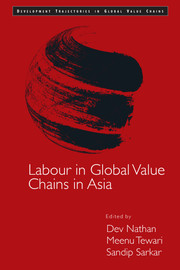Book contents
- Frontmatter
- Contents
- Figures
- Tables
- Foreword
- Preface
- Acknowledgements
- Introduction
- Captive Governance
- Modular Governance
- 11 From Disposable to Empowered: Rearticulating Labour in Sri Lankan Apparel Factories
- 12 Scripted Performances? Local Readings of ‘Global’ Health and Safety Standards in the Apparel Sector in Sri Lanka
- 13 Diffusing Labour Standards Down and Beyond the Value Chain: Lessons from the Mewat Experiment
- 14 Social Upgrading in Mobile Phone GVCs: Firm-level Comparisons of Working Conditions and Labour Rights
- 15 The Politics of Global Production: Apple, Foxconn and China's New Working Class
- 16 New Strategies of Industrial Organization and Labour in the Mobile Telecom Sector in India
- 17 Global Production Networks and Labour Process
- Relational Governance
- Conclusions
- Notes on Contributors
- Index
13 - Diffusing Labour Standards Down and Beyond the Value Chain: Lessons from the Mewat Experiment
from Modular Governance
Published online by Cambridge University Press: 23 July 2017
- Frontmatter
- Contents
- Figures
- Tables
- Foreword
- Preface
- Acknowledgements
- Introduction
- Captive Governance
- Modular Governance
- 11 From Disposable to Empowered: Rearticulating Labour in Sri Lankan Apparel Factories
- 12 Scripted Performances? Local Readings of ‘Global’ Health and Safety Standards in the Apparel Sector in Sri Lanka
- 13 Diffusing Labour Standards Down and Beyond the Value Chain: Lessons from the Mewat Experiment
- 14 Social Upgrading in Mobile Phone GVCs: Firm-level Comparisons of Working Conditions and Labour Rights
- 15 The Politics of Global Production: Apple, Foxconn and China's New Working Class
- 16 New Strategies of Industrial Organization and Labour in the Mobile Telecom Sector in India
- 17 Global Production Networks and Labour Process
- Relational Governance
- Conclusions
- Notes on Contributors
- Index
Summary
‘Minimizing the role of the middlemen—that is actually the whole Mewat model’ (Gap DGP Interview, 2011).
Introduction
In the early hours of a bright Sunday morning on the 25th of November 2012, an unexpected ripple of shock spread through a gathering of academics, policy makers, and social activists who had gathered in Dhaka, Bangladesh to discuss inclusive development in global value chains—such as those in the clothing industry that have helped generate $20 billion annually in foreign exchange for Bangladesh from garment exports to major markets such as the US and the EU. The shock was caused by the disturbing news that a horrific fire had broken out in a garment factory outside Dhaka, and over 120 workers, mostly women, were feared dead. A few hours later, news channels confirmed the fire and the official number of lives lost was placed at 112, the majority of them women.
The investigations that followed revealed huge safety gaps at the factory and pointed to a number of probable causes for the conflagration—missing fire safety certification, a missing external fire exit, no fire extinguishers, illegal construction of six extra floors on top of a building that had structural clearance for only three, poor circulation, unsafe wiring, cramped working conditions, doorways that were locked or blocked with piles of clothing and most egregiously, coercion—the supervisors had paid no heed to the fire alarm, calling it a test and ordering the women who tried to leave the 5th floor (where the fire first broke out) back to their workstations even as they complained of the smell of smoke and suffocation (Yardley, 2012, Manik and Yardley, 2012).
Contrary to what these poor working conditions might suggest, Tazreen Fashions, the factory where the fire broke out, was not a small sweatshop churning out cheap clothing for non-descript low-end local markets. This factory of 1400 workers was a supplier to some of the world's most powerful brands—Walmart and Sears, among others—each of which had their own well-established, well-publicized, and third-party-audited codes of conduct. Yet, the presence of these codes and elaborate protocols of inspection had failed to ensure safer working conditions that could have prevented the blaze. Why did the company codes not filter down to Tazreen?
Information
- Type
- Chapter
- Information
- Labour in Global Value Chains in Asia , pp. 287 - 314Publisher: Cambridge University PressPrint publication year: 2016
